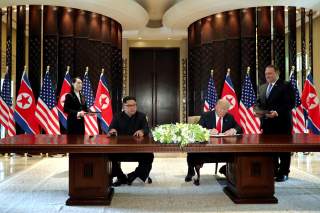Will Trump and Kim Make History?
The concept of a peace regime reflects the new order on the Korean Peninsula.
It’s the Dilemma between Denuclearization and Regime Guarantee!
Even after Moon-Kim and Trump-Kim Summit meetings, it is still difficult to expect to resolve the nuclear issue on the Korean Peninsula. Since the first nuclear test in October 2006, North Korea has conducted six nuclear tests, and dozens of long-range missile tests. In addition, after North Korea succeeded in launching the Hwasong-15 rocket on November 29, 2017, which was evaluated as ICBM, North Korea declared the completion of the nuclear deterrence against the United States.
In fact, North Korea’s policy change in 2018 resulted from its confidence in the power of nuclear weapons, not from the will to denuclearize itself. On April 20, 2018, one week before the Moon-Kim Summit, North Korea declared the “new strategic line” at the plenary meeting of the Central Committee of the North Korean Workers’ Party, aiming at socialist economic development based on nuclear capability. Of course, this meant an important amendment to the “Byungjin” or the parallel line that was announced in March 2013, which seeks to develop the nuclear capability and economy simultaneously. In this meeting, Kim Jong-un declared that “the historical tasks by the Byungjin have been achieved and it is a new strategic line to concentrate all the efforts to build a socialist economy in line with the new high-level demands of the revolutionary development.”
Against this backdrop, North Korea has played a negotiation game with the United States between denuclearization and regime guarantee. When the United States demands the CVID or FFVD on the denuclearization, North Korea demands the CVIG (Complete, Verifiable and Irreversible Guarantee) or FFVG (Final, Fully Verified Guarantee). From the North Korean point of view, the CVIG or FFVG is not secured from the peace treaty or diplomatic normalization with the United States, just as the CVID or FFVD is not achieved by Kim Jong-un’s promise to denuclearize. In reality, there is a dilemma between denuclearization and regime guarantee: which one goes first? North Korea has consistently repeated Kim Il-sung’s claim that the United States has caused the nuclear crisis on the Korean Peninsula by deploying nuclear weapons during the Cold War. This is why North Korea has contended so far that a peace treaty should be established first before any measure on denuclearization. Although the United States and South Korea believe that a peace treaty on the Korean peninsula would be meaningless unless North Korea gives up its nuclear weapons program, North Korea is reluctant to accept the U.S. perspective. While the United States is mostly interested in how to denuclearize North Korea, North Korea is mainly interested in how to secure its regime guarantee.
In this sense, the United States and South Korea need to think about the meaning of peace regime on the Korean Peninsula. Given that there is a tension between denuclearization and a peace regime, it is necessary to deal with the Cold War legacy and the new order of the twenty-first century simultaneously. The peace regime is not only an effort to overcome the legacy of the Korean War, but also reflects the new order on the Korean Peninsula. The Korean Peninsula peace regime was designed to dismantle the hostile relations between the two Koreas and in the U.S.-North Korean relations and also to build a new foundation for a peace in Northeast Asia. From the perspective of the United States and South Korea, the establishment of a peace regime would presuppose the denuclearization of North Korea, so peace would not be realistic without resolving the North Korean nuclear issue. From the North Korean viewpoint, the resolution of nuclear issue will be possible only when a certain degree of peace settlement on the Korean Peninsula is achieved. In addition, China is also deeply involved in these two Korean issues and continues to seek for its influence and involvement.
Because both internal and external situations of the Korean Peninsula have changed a lot during the past decades, the armistice treaty established in 1953 does not guarantee peace and security in the region any longer. The United States and South Korea do not accept the North Korean version of the peace treaty that intends to weaken the U.S.-Korea alliance, so it is imperative to come up with a new concept of a peace regime that resolve the dilemma. The United States and South Korea will not be able to make any progress on denuclearization without a realistic plan for a peace regime. Without a realistic plan for its denuclearization, of course, North Korea will not be able to make any progress on the regime guarantee. Neither denuclearization nor peace regime can go alone. In order to bring peace back to the Korean Peninsula, it is imperative to resolve the dilemma between denuclearization and a peace regime. Will Trump and Kim make history by resolving the dilemma?
Jihwan Hwang is a professor of international relations at the University of Seoul in South Korea.

